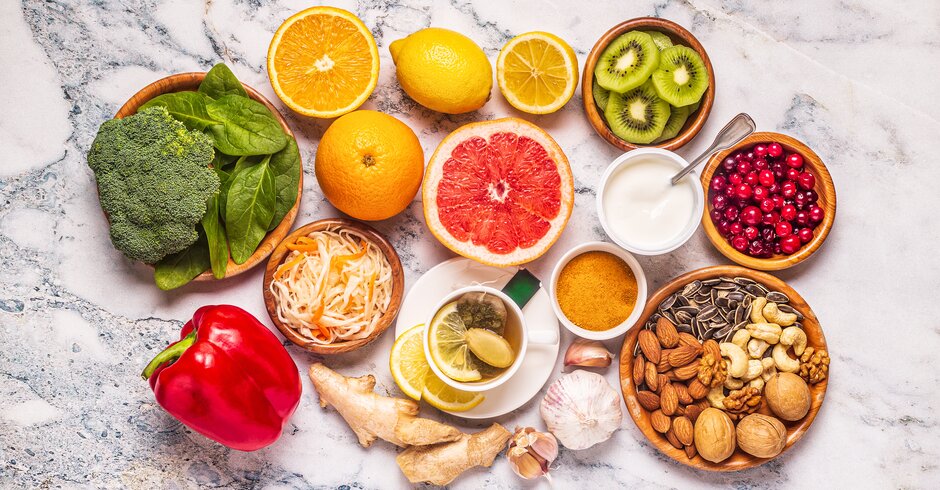Welcome to a new level of well-being

Food: Sour doesn’t always mean acidic
Alkaline or acidic – that is the question.
Some foods are easy to categorise: meat, fish and dairy are generally acid-forming when metabolised, while vegetables and fruit are metabolised as alkaline. But what about foods like lemons or sauerkraut? Are foods that taste sour automatically metabolised as acid too?
We explain why the taste of certain foods can be deceiving – and why this means we can still enjoy our coffee in the morning, and why, in this case, there’s nothing wrong with sour grapes.
We have summed up all the relevant information about this subject in this blog.
The acid-base balance
First things first: the acid-base balance in our body is crucial to our health. Why? Well, simply put, regulation of the acid-base balance is necessary to stabilise the pH value in the blood, since an imbalance has unpleasant consequences.
A food’s PRAL value (PRAL = potential renal acid load) indicates whether it has an alkalising or an acid-forming effect and whether it is metabolised as acid or alkaline: alkaline foods have a negative PRAL value, while acidic products have a positive one.
The goal of an alkaline-rich diet is to incorporate as many metabolically alkaline foods into our diet as possible. This brings the acid-base metabolism into balance, making us feel composed and holistically balanced.
If we consume too many acidifying foods, however, we risk to develop chronic latent acidosis, which causes imbalance, inner unrest and fatigue.
. This makes it all the more important to learn about the principles of a well-balanced, alkaline-rich diet.
However, the sour taste of certain foods can set us on the wrong track. Would you like an example? Here is not one, but five examples of sour foods and their health benefits.
Sauerkraut
This cabbage product has an acidic bite on our tongue but an alkaline effect on our body – how can this be? Like all lactic-acid-fermented foods, sauerkraut contains organic acids. In contrast to inorganic acids, these lactates, acetates and citrates are metabolised by the body as alkaline.
Sauerkraut is especially healthy when consumed raw: it replenishes our vitamin reservoirs, stimulates digestion and can be used in a wide range of dishes.
Our tip: Always buy sauerkraut fresh from the barrel. We guarantee you will taste the difference!
Lemons
We all know the feeling: one bite into this yellow fruit and our mouths automatically pucker. The taste is sour, no doubt about it. This sensation is caused by the citric acid lemons contain.
And yet lemons are thoroughly alkaline – with all the benefits that entails. This has to do with the citrates – the salts of citric acid – the tropical fruit contains, which the body metabolises as alkaline.
In addition, lemons boast a number of valuable nutrients. These include vitamin C, which is crucial for the immune system, as well as the minerals magnesium, potassium and calcium.
Whether you squeeze it in your mineral water or over a salad as a substitute for vinegar, keep enjoying the invigorating taste of this super fruit!
Vinegar
Did you know that the production of vinegar is believed to be one of the world’s oldest food manufacturing processes? People have been making vinegar from soured fruit juices for over 5,000 years.
It’s easy to think that this flavourful additive to salads and the like is metabolised as acid; after all, it has that sour, acidic taste. But that taste is deceptive: the organic minerals contained in this fermented food product actually have an alkaline effect.
The healing power of vinegar was known as early as Hippocrates, who reported its effect on respiratory diseases and indigestion. Since then, another effect has been confirmed: vinegar supports weight loss.
Whether it’s made from herbs, apples or wine, vinegar is a healthy all-rounder that definitely deserves more prominence in our diet.
Apples
Apple varieties such as Granny Smith or Belle de Boskoop are popular due to their pleasant sour taste. Surprisingly, these delicious apples are metabolised as alkaline, just like their sweet counterparts.
Did you know? It’s not just the alkaline properties of apples that substantiate the famous saying “an apple a day keeps the doctor away”; the popular fruit also contains folic acid, beta-carotene and vitamins E, C, B1, B2 and B6, making it a valuable item in nature’s medicine cabinet.
Coffee
The good news is that switching to an alkaline-rich diet doesn’t mean you have to give up your morning coffee: the hot caffeinated beverage is also metabolised as alkaline.
A positive side effect: Coffee is healthy, too. Moderate consumption of this stimulating beverage is associated with a lower risk of cardiovascular disease. The tasty drink is also believed to reduce the risk of diabetes, Alzheimer’s and depression.
What’s more, iced coffee is exceptionally refreshing on hot summer days.
Fit as a fiddle thanks to an alkaline-rich diet
Switching to an alkaline-rich diet is an effective way to correct an acid-base imbalance. It helps the body restore and maintain its holistic balance.
Would you like to learn more about a well-balanced, alkaline-rich diet? Then try it out for yourself! Base fasting provides a gentle first step into the world of alkaline foods, supports the body and helps you achieve balance and inner peace.
Try it out! It’s a true wellness cure for both body and soul.